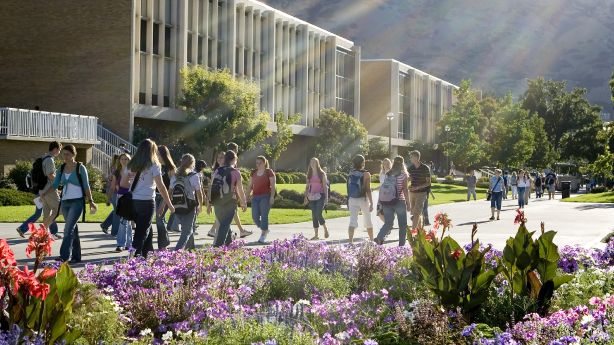BYU, Utah, Utah State self-report 245 cases of COVID-19 from ‘campus community’
PROVO — As colleges and universities across the country reopen their doors following the coronavirus pandemic shutdown, Utah’s institutions of higher education are taking multiple precautions and safeguards to prevent the spread of the virus on campus.
The University of Utah has self-reported 110 cases of COVID-19 on campus through Monday, a number that is a combination of students, faculty and staff. The reported cases is based on a form submitted by individuals of the campus community who tested positive or are awaiting a COVID-19 test. The university estimates that 40 of those cases have recovered, which is traditionally defined as three weeks from the first positive test without death.
KSL.com also confirmed that BYU has self-reported 68 confirmed positive cases of COVID-19 from the students, faculty and staff. The number represents people working at BYU, students who were enrolled in summer classes, or others who were physically present on campus during the spring and summer.
Of the 68 cases, 32 were confirmed during the summer term. An estimated 22 cases are considered recovered.
Utah State has self-reported 67 confirmed cases in its community “regardless of their location in the state or elsewhere” as it asks community members to “provide information essential in helping us prevent the spread of COVID-19 on our campuses.”
The New York Times reported positive case numbers on campuses last week. The Utah System of Higher Education does not publicize positive test cases, and BYU — as a private university — is not required to submit numbers to the public.
At the time of the paper’s initial publication, Utah State had the most positive cases in the state’s university system with 52, followed closely by BYU’s 51, according to the survey of every public four-year college in the country and private schools that compete in NCAA Division I.
Positive tests from university athletics departments play a critical role in overall numbers because they accounted for a bulk of the students who returned to campus over the summer as schools reopened for voluntary workouts beginning in June. The NCAA is expected to make a decision on the fall athletic season following another meeting of its board of governors Wednesday.
Of the other two Utah universities named in the Times’ survey, Dixie State has nine positive cases and Weber State has one. No college or university in Utah had released numbers of positive cases on campus to the media.
Spokespersons from BYU, Utah State and Dixie State did not return KSL’s request for comment. Weber State has previously commented on its one positive case.
The University of Utah, Utah Valley and Southern Utah did not have any cases reported to the Times’ database. After the Utah Department of Health’s 41,907 cases reported Tuesday, Salt Lake County reported 19,683 positive cases, while Utah County has 8,165, and Southwest Utah — which includes Iron County, where SUU is located — has 3,049. It is publicly unclear how many of those positive tests related to each university in their respective jurisdictions, as health and education privacy laws prevent further delineation of the data.
KSL submitted public information requests to the state of Utah’s three Football Bowl Subdivision (FBS) schools — BYU, Utah and Utah State — asking to verify the numbers of tests administered to on-campus residents, as well as the number of positive tests.
Of the three, only BYU responded to the request, denying it. As a private university, the school owned and operated by The Church of Jesus Christ of Latter-day Saints is not bound by public records and access laws.
After the request was made to the U. on July 2, the university had 10 business days to respond, per government records access and management regulations. On July 17, KSL received a notice that the university was extending the request until Aug. 7 because it was “unable to respond to your request within this time frame for at least one of the reasons described in Utah Code 63G-2-204(6)(c), including but not limited to the extraordinary circumstances that the governmental entity is currently processing a large number of records requests.”
During a conference call with reporters on Friday, Utah athletic director Mark Harlan said that the decision to not release numbers of positive tests among student-athletes was “on me.”
“What I feel is most important in this matter is that we follow all the university, county and state guidelines as it relates to our testing,” Harlan said. “Any result, positive or negative, we send on to the proper authorities. I believe that’s our obligation.
“I just don’t believe our student-athletes should be singled out in the population, for positives or negatives. I believe in transparency, but I think in this case it’s also our obligation to protect the privacy of our student-athletes.”
A similar request sent to Utah State on July 2 went unacknowledged.
That cases of COVID-19 arise on college campuses is not a surprise. A report by NJ.com Monday showed that as many as 28 cases can be traced to a single on-campus party at Rutgers, which recently suspended football activities to quarantine and isolate its entire roster.
The Scarlet Knights aren’t alone; programs from Clemson to Ohio State to reigning national champion LSU — among several others — have (at least temporarily) shut down voluntary workouts due to a rising number of coronavirus cases within the program. As numbers of positive coronavirus cases approach 5 million, it’s hard to find a corner of the country that hasn’t been touched by the pandemic.
And while no college athletic team has shut down workouts — at least, not publicly — it seems likely that positive cases have cropped up in their realms. BYU football opened training camp Tuesday, while the University of Utah will begin mandatory workouts with the rest of the Pac-12 on Aug. 17.
The single case at Weber State was known, and even announced by the university that a student-athlete on the track and field team who lives off campus contracted the virus in March.
“Coaches and other members of the team who had direct contact with this individual are aware and are being asked to social distance and self-monitor,” the university said in a letter to students.
No other cases have been reported from the Ogden-based university since March 21.
BYU had a student test positive for COVID-19 back in March, which the university publicly acknowledged. It has not released additional information to the public since then.
As far as coronavirus cases in his program, BYU football coach Kalani Sitake said he’s not “free to answer” those types of questions. He did add that the program is complying with NCAA regulations, including mandatory temperature checks, social distancing when possible, and wearing masks when possible — including during portions of practices and workouts.
“This administration has done a great job organizing the screening process, and our doctors and sports medicine staff have done a great job educating players,” Sitake said after Tuesday’s practice. “It’s important that we do our part so that we can keep doing this, and so we can play football.”
The Cougars reopened campus for student-athletes to conduct voluntary workouts in June and received a waiver from the NCAA to begin mandatory workouts in August, despite not having a game scheduled until Oct. 2 against Utah State. Athletic director Tom Holmoe said he is actively working on the football schedule, which recently lost six games to Power Five opponents, but admitted it seemed unlikely that a full 12-game schedule would be played in 2020.
The other university in Utah named by the Times’ report, Dixie State, has also allowed student-athletes to return to campus to begin preparations for the fall season. That includes football, which will compete in its first season as an FCS independent — but has had four games cancelled due to other conferences and teams scaling back to conference-only play or pushing the season to the spring.
The Trailblazers, who reported nine positive cases of the coronavirus on campus, never expected to be virus-free in 2020, even as it planned to open campus to a blended model of both in-person and online learning.
The university’s approach became less about if a positive case emerged on campus, and more about how the school would respond to contain and limit the spread.
“If we think we are doing all this and expecting not a single case on campus, that’s probably not going to happen. We’re doing everything possible to protect our students,” Dixie State president Richard Williams told KSL back in May. “But we need to make sure the public knows we’re going to do everything we can to create safe spaces. It’s just impossible to create a campus that doesn’t have a case or two.”
Or even nine, as it were.
But as students begin to migrate back to campus for the fall semester, more cases are likely to emerge.
×
Related Links
 Sean Walker
Sean Walker

